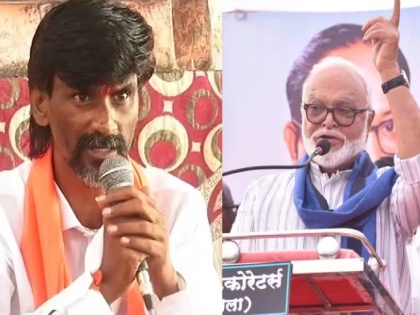Manoj Jarange urges legal action against Chhagan Bhujbal for alleged use of casteist language
By Lokmat English Desk | Published: November 27, 2023 03:02 PM2023-11-27T15:02:25+5:302023-11-27T15:02:49+5:30
Veteran leader Chhagan Bhujbal, in recent times is being accused of instigating caste-related tensions. There seems to be a growing ...

Manoj Jarange urges legal action against Chhagan Bhujbal for alleged use of casteist language
Veteran leader Chhagan Bhujbal, in recent times is being accused of instigating caste-related tensions. There seems to be a growing influence of OBC leaders, including Bhujbal, on the government, raising questions about the government's responsiveness to their concerns. There is a plea to the government, urging them to hear the grievances of OBC leaders and ensure fairness for the impoverished Maratha community. Despite the plea, concerns have been raised about Bhujbal's inflammatory language, with Manoj Jarange Patil calling for legal action against him for using casteist words.
Manoj Jarange Patil has expressed concern over the use of casteist language by Chhagan Bhujbal, particularly in reference to the Bhima-Koregaon incident. Patil is urging the government to take action against the senior leader, emphasizing that such language is fueling caste-based divisions. He highlights the difficulty in bringing Marathas and Dalits together, emphasizing that this issue pertains to the actions of specific elderly leaders, not the broader OBC community. Patil said that if the government fails to curb such behavior, it may lead to further discord. Bhujbal's use of a casteist term, specifically mentioning the word "Mahar" at a rally in Hingoli, has not gone unnoticed, raising questions about why such incidents are tolerated. Patil challenges the labeling of Dalit brothers as casteist and expresses concern about directly insulting them. He brings attention to the historical context, mentioning the washing of the martyrs' memorial with cow urine, and questions the sincerity of current statements in light of past actions. Patil denies any enmity between Dalit brothers and others, emphasizing the need for fair treatment and questioning the tendency to interpret statements as having a communal bias.
There is no animosity with our fellow OBC brothers. In fact, many of them regret the situation where certain individuals are perceived as hindering the progress of poor children. The concern arises from the recent emergence of 29 sub-categories within the OBC community, leading to reports that the Maratha community is being denied reservations due to the increased competition. Interestingly, the demand for a separate category within the OBC itself has been raised, prompting questions about the fairness of such a proposition and whether it is unjust to other castes. Those familiar with the law are urged to produce government records related to the Maratha community, challenging the notion that they have been overlooked. The argument is made that if records indicate a history of punishment or discrimination based on village bans, then the Marathas too could qualify for OBC status.
Jarange Patil clarifies his earlier statement, emphasizing that the issue is not about working under those who may not deserve it but rather about addressing the challenges faced by educated unemployed individuals within their community. He urges against giving the matter a communal color and dismisses Chhagan Bhujbal's involvement, suggesting that Bhujbal might not have other pressing concerns.
Patil is keen to clarify that his statement is not directed at any particular community and challenges anyone to find a single instance where he has expressed discriminatory views. He emphasizes his cooperation with people from diverse castes and religions, highlighting his inclusive approach. Addressing concerns about the delay in granting Maratha reservations, Patil attributes the prolonged process to discussions around issues of racism. He acknowledges Bhujbal's experience but advises him to be wise, pointing out that times have changed, and OBC leaders are expressing a desire not to align themselves with him.
Patil concludes by alleging that the government is under pressure, suggesting that there are external influences influencing decision-making, particularly in relation to caste tensions.
Open in app